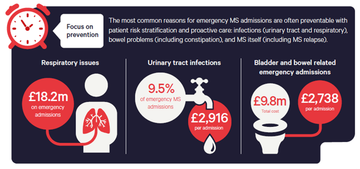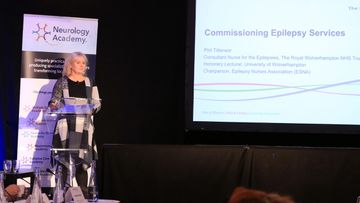Commissioning for the neurogenic bladder
Event reportsOn 27th May, 60 healthcare professionals spanning commissioning, management, clinical work and the voluntary sector gathered to hone their understanding of neurology commissioning. Find our conference overview here or read on for a better understanding of commissioning in neurology!
Jane Young, a London-based Bladder and bowel nurse consultant presented the case for commissioning services for the neurogenic bladder. This was highly topical given the new guidance just published and pathway anticipated for bladder management in MS.
The neurogenic bladder is a significant problem for those living with a neurological condition, she explained, but has a very low profile when it comes to management, yet studies have shown that bladder dysfunction significantly influences quality of life measures, early care or nursing home admission, and health economics.
Lower urinary tract (LUT) dysfunction is one of the most common autonomic disorders with an estimated incidence rate of 27-80% and Hospital episode statistics (HES) data collated annually reveal bladder and bowel problems as a major cause of admissions (fig 1).

Fig 1: An excerpt from an MS Academy and Wilmington Healthcare infographic reviewing MS emergency admissions for 2019-2020 data (Jan 2020)
She highlighted the Excellence in Continence Care (EICC) report (NHS 2018) which sought to understand patient needs, improve patient safety and outcomes, agree national standards and promote best practice and NHS England's national bladder and bowel health project, commissioned in 2019 to improve continence care across the whole health and care system - both of which were poorly impacted by the pandemic.
Jane shared a whole host of issues currently facing bladder management, from a lack of training around assessment and management of bladder dysfunction and poor adherence to guidance through to poor management and follow-up, and a lack of resources compounded by backlogs from the pandemic which further impact inequalities in provision.
She urged commissioners to be Bladder Aware and gave practical ways that they could improve services (table 3).
Table 3: Useful steps to take to 'Be Bladder Aware'.
| 8 steps to improve bladder and bowel services: |
|---|
| 1. ICS collaboration between bladder and bowel services |
| 2. Pathways for management |
| 3. MDT working between primary and secondary care |
| 4. Every borough needs a clinical nurse specialist (CNS) |
| 5. Resources to stop disparity in provision |
| 6. Timely access to help |
| 7. UTI kits - for earlier identification of expensive bladder infections |
| 8. Patient education, information and empowerment |
Related articles
Meet with strategic and operational colleagues in neurology
Join us for the Neurology Manager Network Meeting which will enable senior managers and directors in neurology services to update their knowledge on current neurology service delivery.


